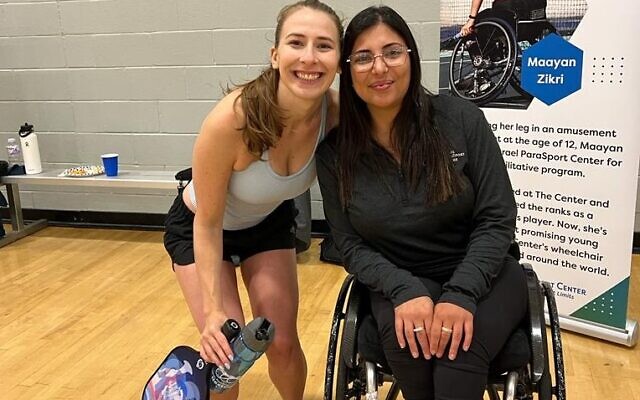Paralympian Tabib and the Importance of Pickleball
The MJCCA and Israel ParaSport Center recently hosted a pickleball tournament that supported the Israeli organization’s efforts in assisting children and adults living with physical disabilities.

Earlier this month, on the morning of Sunday, June 11, the Marcus Jewish Community Center of Atlanta, in conjunction with the Israel ParaSport Center, hosted a pickleball tournament in which dozens of young pickleball enthusiasts came out to support the venerable Israeli organization that serves thousands of children and adults living with physical disabilities. Ironically, the keynote speaker, whose talk preceded the tourney, is world renown not for pickleball, but rather for another sport requiring similarly adroit hand-eye coordination, that of wheelchair table tennis.
Before pickleball competition ensued, two-time Paralympian (2016 Summer Olympics in Rio de Janeiro and 2020 Summer Olympics in Tokyo) Caroline Tabib took the podium to enlighten the audience about her journey to athletic stardom and the noble work being done by the Israel ParaSport Center (formerly known as the Israel Sport Center for the Disabled and a partner agency of the Atlanta Jewish Federation), to which she remains tirelessly devoted.
“I think what amazed me the most was how many young Jewish people are willing to come out on a Sunday morning and participate for a good cause,” Tabib shared with the Atlanta Jewish Times following the event. “They came early just to hear me speak about what the center is all about, our goals, the purpose. This is really something—the sense of community, and how such young adults want to get involved.”
Tabib and her inspiring background may have been the center of attention as she was born with congenital paraplegia, meaning she was paralyzed from the waist down, and started going to hydrotherapy twice per week at age six before picking up table tennis two years later. However, the 16-team tournament would not have come to fruition without the efforts on behalf of NextGen Atlanta Committee members Zoe Starr, Haley Codron, Ariel Stern, Sammi Nozick, and Jessica Mencher, all of whom are active members of Atlanta’s Jewish community. In particular, Starr, who spent months spearheading the initiative alongside Becca Near, Midwest & new initiatives director for The Israel ParaSport Center, knew that the wildly popular sport of pickleball would be a perfect catalyst for piquing the public’s interest.
“I first got involved with the Israel ParaSport Center two years ago when I spent my summer working there,” explained Starr, whose father, Todd, is one of the Israel ParaSport Center’s national board members. “It was the best summer of my life getting to interact with all of the athletes at The Center.”
Tabib epitomizes what it means to be an athlete at the Israel ParaSport Center, whose four-acre campus, which lies inside Ramat Gan on the edge of the Yarkon River bordering Tel Aviv, provides rehabilitative and competitive adaptive sport programs for nearly 3,000 Israeli athletes with physical disabilities — not just because she is gearing up for her third Paralympics next summer in Paris…or because she is ranked sixth in the world; but because, when she was a toddler, doctors expressed little optimism that she’d ever be able to transcend her physical limitations—and now she’s one of the most accomplished table tennis players on the planet.
I think what amazed me the most was how many young Jewish people are willing to come out on a Sunday morning and participate for a good cause. They came early just to hear me speak about what the center is all about, our goals, the purpose. This is really something—the sense of community, and how such young adults want to get involved.
“You have to be physically strong [for table tennis], but it’s also a lot of strategy and planning,” said Tabib, who, while transitioning from swimming and basic wheelchair control activities to mastering table tennis, also served in the Israeli Air Force and took business school classes, among other endeavors.
Though she was apparently a natural at the sport—at age 12, she was crowned an Israeli champion—her first brush with global competition at a tournament in Italy two years later, while not a particularly gratifying experience, represented a pivotal moment in her then-fledgling career.
“It went really badly,” admitted Tabib. “After I became the Israel champion, I thought no one could beat me, I was the best in the world. I was humbled because I got like three points in the entire tournament. It was then when I decided that I wanted to become more professional and train harder.”
While she’s an internationally ranked table tennis player, Tabib has fairly limited experience with pickleball, given that she resides in Israel where the sport hasn’t caught on like it has stateside. After being on hand for the June 11th pickleball tournament at the MJCCA, does she feel any more inclined to pursue the sport on a competitive level?
“I love the game,” Tabib answered. “It’s really fun to watch. I tried a little bit. Very different from table tennis. You’re using different muscles to play. I don’t think I will play it professionally. I’m not comparing myself to Michael Jordan, but when he tried to do something else other than basketball, it didn’t go so well. I will stick to my table tennis and the things that I know, but I am very interested in bringing this sport to Israel. I don’t think anyone in Israel plays pickleball. If it became a Paralympic sport, I would also be very happy.”
- Sports
- Community
- David Ostrowsky
- Marcus Jewish Community Center of Atlanta
- Israel ParaSport Center
- pickleball tournament
- physical disabilities
- 2016 Summer Olympics
- 2020 Summer Olympics
- Caroline Tabib
- Israel Sport Center for the Disabled
- Atlanta Jewish Federation
- NextGen Atlanta Committee
- Zoe Starr
- Haley Codron
- Ariel Stern
- Sammi Nozick
- Jessica Mencher
- Becca Near
- Ramat Gan
- Yarkon River
- Basketball



comments